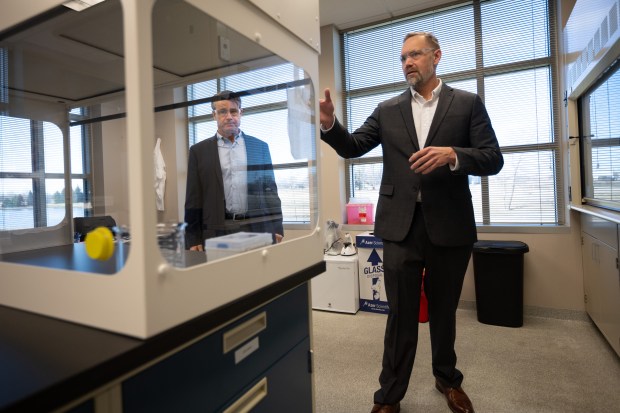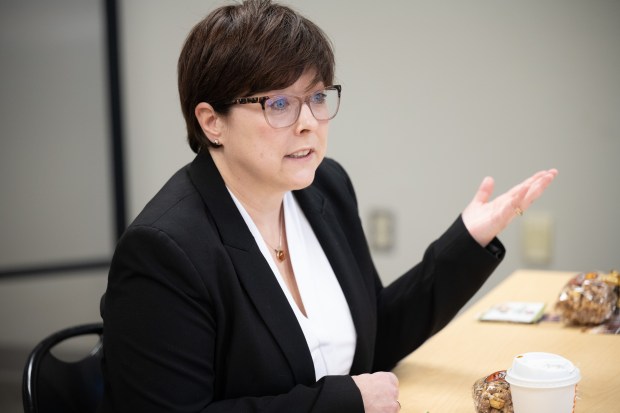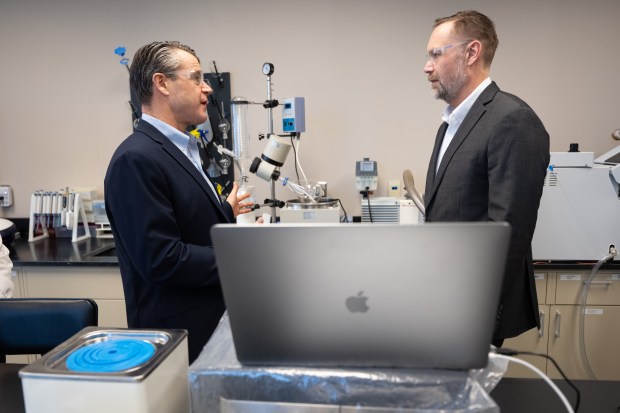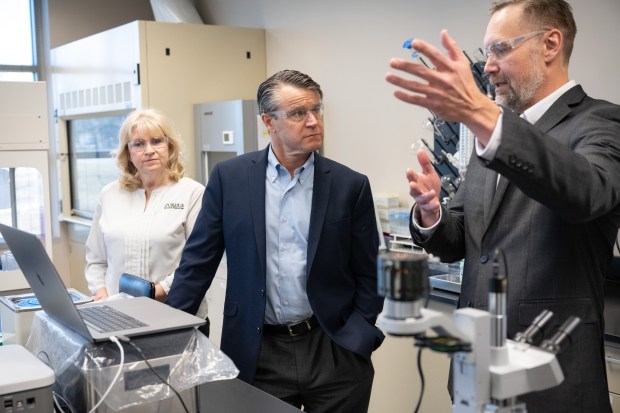U.S. Senator Todd Young, R-Indiana, toured the Crown Point offices of pharmaceutical start-up Neurodon on Thursday as the company moves ahead with the development of drugs that it says will revolutionize the treatment of diseases like Alzheimer’s, Parkinson’s, and diabetes.
Founded in 2014, Neurodon is studying molecules that it says can address the root cause of a variety of health conditions by restoring calcium balance to cells, work that Young lauded as “inspiring.”
Calcium serves as a signal for a variety of processes in the human body. Certain kinds of diseased cells, like those found in the brain of an Alzheimer’s sufferer or the pancreas of someone with diabetes, show an imbalance of the element, with too much calcium free-floating in the cell and too little in the endoplasmic reticulum (ER) — a multi-purpose cellular structure that serves as a calcium store in healthy cells.
This imbalance, called ER stress, is known to contribute to an array of diseases that affect the brain, circulatory system, liver, and kidneys, among other parts of the body. Neurodon CEO Russell Dahl explained that the company can treat ER stress with a molecule that activates an enzyme called SERCA, a naturally occurring tool used by cells to move calcium into the ER.
“Now that sounds a lot simpler than it was, because pharma has been trying to do it forever,” Dahl said.
Studies on mice have proved promising, with the company’s treatment demonstrating an ability to reduce the body weight of obese mice and improve the cognitive functioning of mice with neurological degeneration. Dahl noted that the benefits of the company’s treatments persisted after researchers stopped dosing the mice, suggesting that Neurodon’s drugs could provide lasting relief for human patients.

In 2020, Neurodon received a $2 million federal grant from the National Institute on Aging at the National Institutes of Health for its Alzheimer’s research. The company has worked closely with Purdue University, and has its office space in the university’s Northwest Indiana research park.
Neurodon is in the process of an investigational new drug (IND) application with the U.S. Food and Drug Administration for a diabetes treatment, and plans to begin an application for an Alzheimer’s drug candidate soon. IND approval is a prerequisite for clinical trials with human patients. Dahl said that the company is on track to begin the trials by 2025.
The biggest barrier to the next step of Neurodon’s drug development process, Dahl told Young, is funding, a factor compounded by the company’s location outside of traditional hubs of pharmaceutical industry innovation. He contrasted Northwest Indiana with Boston, San Francisco, and other areas home to myriad venture capital firms that specialize in the biotech sphere.

“We don’t have money to do the clinical trial because that’s going to be tens of millions of dollars, so we’re we’re aggressively fundraising right now,” he said. “I can’t even think of a real major biotech-focused (venture capital firm) within a hundred miles of here.”
Young acknowledged Dahl’s concerns, but suggested that the company has the opportunity to reshape the regional economy through its success.
“I would hope you feel like a potentially really big fish now in a small pond, right?” he said. “That’s one advantage, I suppose, to staying.”

Dahl agreed.
“If we get IND-approved and go into clinic, it’ll put us on the map,” Dahl said. “My goal is to bring in some more biotech, make (the region) a biotech hub.”
Young has been a vocal advocate of moving production of semiconductors back to the United States, along with expanded federal funding for domestic scientific research and STEM education through the CHIPS in Science Act, which was signed into law in 2022.




